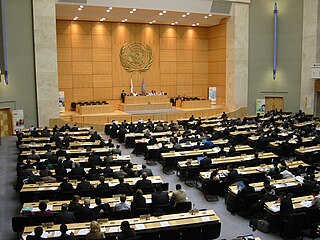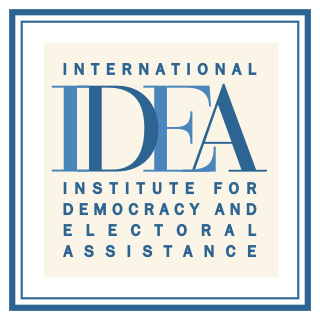
The World Summit on the Information Society (WSIS) was a two-phase United Nations-sponsored summit on information, communication and, in broad terms, the information society that took place in 2003 in Geneva and in 2005 in Tunis. One of its chief aims was to bridge the global digital divide separating rich countries from poor countries by increasing internet accessibility in the developing world. The conferences established 17 May as World Information Society Day.

The United Nations Information and Communication Technologies Task Force was a multi-stakeholder initiative associated with the United Nations which is "intended to lend a truly global dimension to the multitude of efforts to bridge the global digital divide, foster digital opportunity and thus firmly put ICT at the service of development for all".
Global governance or world governance is a movement towards political cooperation among transnational actors, aimed at negotiating responses to problems that affect more than one state or region. Institutions of global governance—the United Nations, the International Criminal Court, the World Bank, etc.—tend to have limited or demarcated power to enforce compliance. Global governance involves multiple states, as well as international organizations, with one state having more of a lead role than the rest. The modern question of world governance exists in the context of globalization and globalizing regimes of power: politically, economically and culturally. In response to the acceleration of worldwide interdependence, both between human societies and between humankind and the biosphere, the term "global governance" may name the process of designating laws, rules or regulations intended for a global scale.

The Internet Governance Forum (IGF) is a multistakeholder governance group for policy dialogue on issues of Internet governance. It brings together all stakeholders in the Internet governance debate, whether they represent governments, the private sector or civil society, including the technical and academic community, on an equal basis and through an open and inclusive process. The establishment of the IGF was formally announced by the United Nations Secretary-General in July 2006. It was first convened in October–November 2006 and has held an annual meeting since then.

The International Institute for Democracy and Electoral Assistance is an intergovernmental organization that works to support and strengthen democratic institutions and processes around the world, to develop sustainable, effective and legitimate democracies. It has regional offices in Europe, Latin America and the Caribbean, Asia and the Pacific and Africa and West Asia. The organization is headquartered in Stockholm, Sweden.

The Global Reporting Initiative is an international independent standards organization that helps businesses, governments and other organizations understand and communicate their impacts on issues such as climate change, human rights and corruption.
The Centre for Policy Dialogue (CPD), established in 1993 by Rehman Sobhan, its Founder chairman, with support from leading civil society institutions in Bangladesh, is mandated by its Deed of Trust to service the growing demand originating from the emerging civil society of Bangladesh for a more participatory and accountable development process. CPD seeks to address this felt-need from the perspectives of marginalised stakeholders, by way of organising multistakeholder consultations, by conducting research on issues of critical national, regional and global interests, through dissemination of knowledge and information on key developmental issues, and by influencing the concerned policy making processes.
Governance is a broader concept than government and also includes the roles played by the community sector and the private sector in managing and planning countries, regions and cities. Collaborative governance involves the government, community and private sectors communicating with each other and working together to achieve more than any one sector could achieve on its own. Ansell and Gash (2008) have explored the conditions required for effective collaborative governance. They say “The ultimate goal is to develop a contingency approach of collaboration that can highlight conditions under which collaborative governance will be more or less effective as an approach to policy making and public management” Collaborative governance covers both the informal and formal relationships in problem solving and decision-making. Conventional government policy processes can be embedded in wider policy processes by facilitating collaboration between the public, private and community sectors. Collaborative Governance requires three things, namely: support; leadership; and a forum. The support identifies the policy problem to be fixed. The leadership gathers the sectors into a forum. Then, the members of the forum collaborate to develop policies, solutions and answers.
Environmental governance is a concept in political ecology and environmental policy that advocates sustainability as the supreme consideration for managing all human activities—political, social and economic. Governance includes government, business and civil society, and emphasizes whole system management. To capture this diverse range of elements, environmental governance often employs alternative systems of governance, for example watershed-based management.
The Evian Group at IMD is an international coalition of corporate, government and opinion leaders, committed to fostering an open, inclusive, equitable and sustainable global market economy in a rules-based multilateral framework.

The Center on International Cooperation (CIC) is a foreign policy think tank based at New York University that works to enhance multilateral responses to global problems, including: conflict, humanitarian crises, and recovery; international security challenges, including weapons proliferation and the changing balance of power.; and resource scarcity and climate change. Through innovative applied research and direct engagement with policy actors, CIC has been at the forefront of policy decision-making in each of its core areas of research.

Collaborative e-democracy is a democratic conception that combines key features of direct democracy, representative democracy, and e-democracy. The concept was first published at two international academic conferences in 2009.
The governmental learning spiral© is a method to structure face-to-face or virtual innovation and learning events such as workshops, conferences, roundtables, trainings, e-learning, etc. to solve complex political problem situations and governance challenges. The governmental learning spiral is based on a heuristic and multidisciplinary approach that was theoretically and conceptually developed over the last two decades and successfully applied worldwide in numerous local, national as well as international events to improve performance in democratic governance. The method has been described for the first time by Raoul Blindenbacher and Ronald Lampman Watts in the book "Federalism in a Changing World", a publication edited by Raoul Blindenbacher and former Swiss President Arnold Koller in 2003. The governmental learning spiral was further developed in the World Bank publication "The Black Box of Governmental Learning" in 2010.

Political economy of climate change is an approach that applies the political economy thinking concerning social and political processes to study the critical issues surrounding decision-making on climate change.

The OECD Development Centre was established in 1961 as an independent platform for knowledge sharing and policy dialogue between Organisation for Economic Co-operation and Development member countries and developing economies, allowing these countries to interact on an equal footing.
The Global Forum on Migration and Development (GFMD) is a state-led, informal and non-binding process, which helps shape the global debate on migration and development. It provides a flexible, multi-stakeholder space where governments can discuss the multi-dimensional aspects, opportunities and challenges related to migration, development, and the link between these two areas. The GFMD process allows governments - in partnership with civil society, the private sector, the UN system, and other relevant stakeholders – to analyze and discuss sensitive issues, create consensus, pose innovative solutions, and share policy and practices.
Multistakeholder governance is a practice of governance that employs bringing multiple stakeholders together to participate in dialogue, decision making, and implementation of responses to jointly perceived problems. The principle behind such a structure is that if enough input is provided by multiple types of actors involved in a question, the eventual consensual decision gains more legitimacy, and can be more effectively implemented than a traditional state-based response. While the evolution of multistakeholder governance is occurring principally at the international level, public-private partnerships (PPPs) are domestic analogues.
African Consensus is an economic paradigm proposed in 2011 for sustainable development in Africa. It is built on practical experiences across the African continent together with shared experiences from other regions facing similar challenges. It merges existing efforts of civil society in such areas as renewable energy, community finance and empowerment, organic agriculture and water resource management, environmental and endangered species protection. It couples these with the pragmatic experiences of business and finance in an attempt to scale these efforts into viable economic models. Seeking a pragmatic path for development, it emphasizes the importance of heritage, cultural and identity protection with the need for economic advancement.

Anriette Esterhuysen is a human rights defender and computer networking pioneer from South Africa. She has pioneered the use of Internet and Communications Technologies (ICTs) to promote social justice in South Africa and throughout the world, focusing on affordable internet access. She has been the Executive Director of the Association for Progressive Communications since 2000 until April 2017, when she became APC's Director of Policy and Strategy. In November 2019 United Nations Secretary-General António Guterres appointed Anriette Esterhuysen as the new Chair of the Internet Governance Forum’s Multistakeholder Advisory Group.
The Internet & Jurisdiction Policy Network, also known as "I&J Policy Network", "Internet & Jurisdiction, or simply "I&J", is the multistakeholder organization fostering legal interoperability in cyberspace. Its Secretariat facilitates a global policy process between key stakeholders to enable transnational cooperation and policy coherence. Participants in the Policy Network work together to preserve the cross-border nature of the Internet, protect human rights, fight abuses, and enable the global digital economy. Since 2012, the Internet & Jurisdiction Policy Network has engaged more than 300 key entities from different stakeholder groups around the world, including governments, the world's largest Internet companies, the technical community, civil society groups, leading universities and international organizations.









